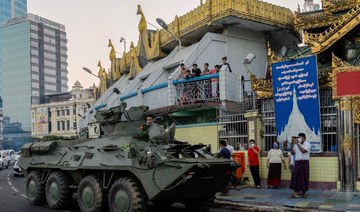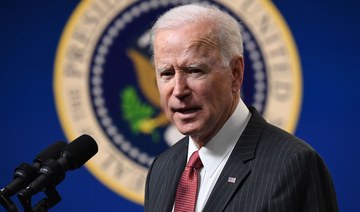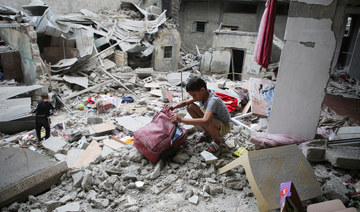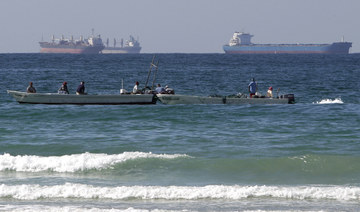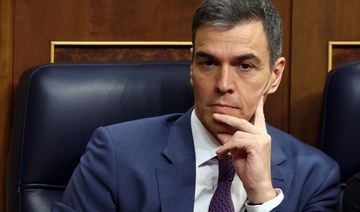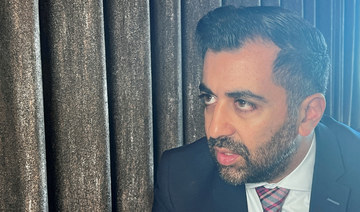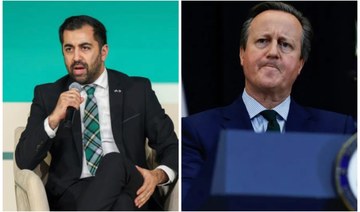YANGON: Three “police officers” and a civilian were held for several hours on Saturday night by residents of Hmawbi, a small town about 40 km north of Myanmar’s largest city, Yangon.
Residents held the four “out of fear and suspicion,” tying them with ropes before taking them to the nearest police station for verification.
“Three police apprehended a drug dealer while patrolling on Saturday night, then kept on patrolling and were held by the crowd,” a police officer, who asked not to be named as he was not authorized to speak to the media, told Arab News over the phone on Sunday.
“It was a misunderstanding as residents reacted to them with panic. We understand their fear and anxiety. So, there will be no action against the residents,” he said.
Similar incidents were also reported from other areas of the city on Saturday. In some cases, volunteers in ambulances were blocked from picking up patients.
Widespread fear and panic among Yangon residents and elsewhere in Myanmar has become the norm since the military’s coup on Feb. 1.
Tens of thousands of protesters gathered across Yangon, the country’s biggest city with a population of more than 5 million, as mass demonstrations against the military junta gained momentum across the nation. A curfew was then imposed.
Several residents, however, have defied the curfew since Friday night following reports of thugs — allegedly working for the security forces — planning to commit arson, robbery and poisoning of public wells.
The anger was fueled by a spike in arrests of opposition party members, such as activists and public servants, during midnight raids by security forces.
More than 350 people, including officials, activists and monks, have been arrested since the military coup, the UN’s human rights office said on Friday.
More detentions are expected to follow.
Meanwhile, the National Administrative Council, led by coup leader and military chief Min Aung Hlaing, said on Saturday it was suspending laws legalizing the arrest without warrant and detention of a suspect beyond 24 hours.
However, it also ordered forces to hunt down “seven dissidents,” including Min Ko Naing, an activist considered the second-most influential person after detained leader and former Nobel Peace Prize laureate, Aung San Suu Kyi.
Residents in Yangon and other parts of the country are responding with anger and defiance, with some blocking the streets and others patrolling in groups to “protect themselves” at night.
In most townships of Yangon, residents have declared that a few would “rule certain quarters themselves” after losing faith in the government’s administrative mechanism.
Ko Phyo, a middle-aged man in the Mingalar Taung Nyunt township of Yangon, said that some residents had started wearing white helmets for easy identification and to distinguish themselves from strangers.
“We will have a series of meetings today and in the coming days to make the patrol more systematic,” he told Arab News on Sunday.
“Otherwise, we cannot sleep at night,” he said.
Aye Kyu, a 54-year-old resident of Yangon’s Hlaing township, said that his neighbors had teamed up to guard the area at night, starting from Friday when the junta released more than 23,000 prisoners under an amnesty marking the country’s Union Day.
“It was very similar to the situation just days before the brutal military crackdown on protesters in 1988,” he said, recalling the tactics employed by the former authorities who had allegedly deployed thugs to create unrest and chaos.
“They now need a reason to crack down on us. So they are creating a chaotic situation by making people feel insecure and respond with panic,” he told Arab News on Saturday.
“We now need to keep an eye open all the time. So, we agreed to assign ten men each night to guard the neighbors. We have no one to protect us. Police and soldiers are acting like thugs to us,” Aye Kyu said.
After the military junta legalized arrests without warrants, some residents have resorted to using metal pots and pans to create a noise and wake up neighbors in case of any unusual activity.
Over the past two nights, such noises were heard across Yangon, disturbing resident’s sleep.
Myo Min Thu, a 24-year student and a resident of Yangon’s Tarmwe township, has been actively participating in protests against the military coup and the regime since the first day of the demonstrations.
He said that people in the quarter he lives in have been discussing plans to continue their anti-coup movement.
“The elderly said they could guard the neighbors, and make noise and wake people only when they found things suspicious,” he told Arab News on Sunday.
“They said young people are yet to take to streets. By sharing the duties, we will keep the resistance on,” he said.
Sleepless in Yangon: Myanmar residents share night patrol duties to avoid arrests
https://arab.news/8974u
Sleepless in Yangon: Myanmar residents share night patrol duties to avoid arrests
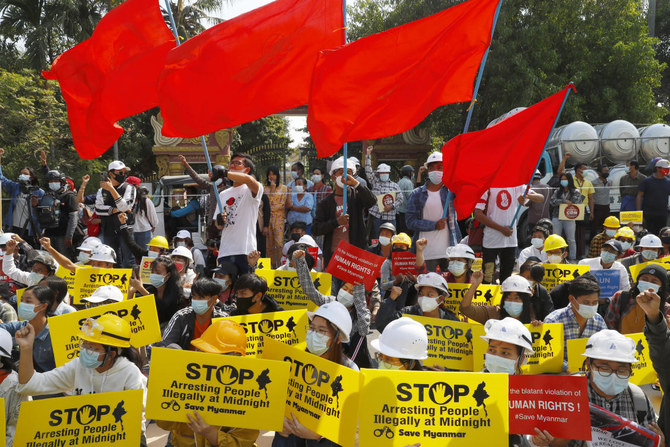
- Move follows reports of gangsters, allegedly employed by security forces, planning to commit arson, robbery and poisoning of public wells
- Widespread fear and panic among residents has become the norm since the coup on Feb. 1
Ukraine’s Zelensky urges US to speed up weapons deliveries
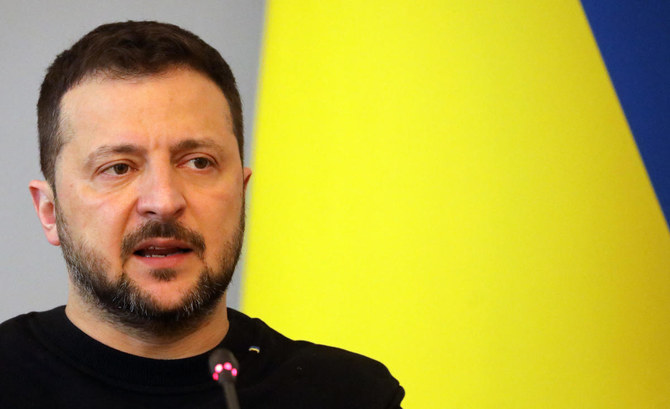
Zelensky told a joint news conference in Kyiv alongside visiting NATO chief Jens Stoltenberg that the situation on the battlefield directly depended on the speed of ammunition supplies to Ukraine.
“Timely support for our army. Today I don’t see anything positive on this point yet. There are supplies, they have slightly begun, this process needs to be sped up,” he said.
Scotland’s Humza Yousaf quits in boost to Labour before UK vote
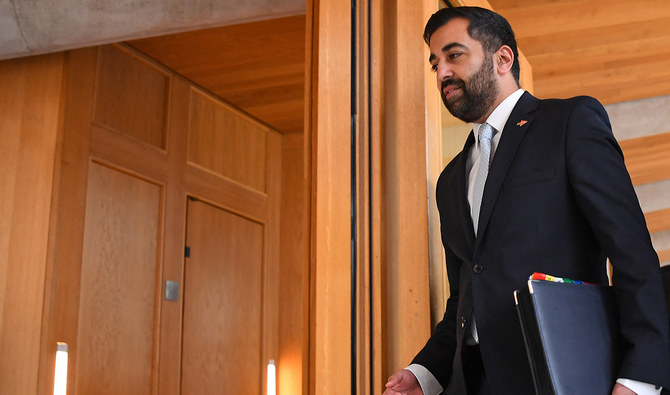
- Yousaf quit after a week of chaos triggered by his scrapping of a coalition agreement with Scotland’s Greens
- He then failed to secure enough support to survive a vote of no confidence against him expected later this week
LONDON: Scotland’s leader Humza Yousaf resigned on Monday, further opening the door to the UK opposition Labour Party regaining ground in its former Scottish heartlands during a national election expected to be held later this year.
Yousaf said he was quitting as head of the pro-independence Scottish National Party (SNP) and first minister of Scotland’s devolved government after a week of chaos triggered by his scrapping of a coalition agreement with Scotland’s Greens.
He then failed to secure enough support to survive a vote of no confidence against him expected later this week.
Resigning little over a year after he replaced Nicola Sturgeon as first minister and SNP leader, Yousaf said it was time for someone else to lead Scotland.
“I’ve concluded that repairing our relationship across the political divide can only be done with someone else at the helm,” Yousaf said, adding he would continue until a successor was chosen in an SNP leadership contest.
Yousaf abruptly ended a power-sharing agreement between his pro-independence SNP and the Green Party after a row over climate change targets. The SNP’s fortunes have faltered over a funding scandal and the resignation of Sturgeon as party leader last year. There has also been infighting over how progressive its pitch should be as it seeks to woo back voters.
Caught between defending the record of the coalition government and some nationalists’ demands to jettison gender recognition reforms and refocus on the economy, Yousaf was unable to strike a balance that would ensure his survival.
The SNP is losing popular support after 17 years of heading the Scottish government. Earlier this month, polling firm YouGov said the Labour Party had overtaken the SNP in voting intentions for a Westminster election for the first time in a decade.
Labour’s resurgence in Scotland adds to the challenge facing British Prime Minister Rishi Sunak’s Conservative Party which is lagging far behind Labour in UK-wide opinion polls.
The Scottish parliament now has 28 days to choose a new first minister before an election is forced, with former SNP leader John Swinney and Yousaf’s former leadership rival Kate Forbes seen as possible successors.
If the SNP is unable to find a new leader to command support in parliament, a Scottish election will be held. Yousaf, the first Muslim head of government in modern Western Europe, succeeded Sturgeon as first minister in March 2023. Once hugely popular, Sturgeon has been embroiled in a party funding scandal with her husband, who was charged this month with embezzling funds. Both deny wrongdoing.
Iran slams crackdown on US student protesters
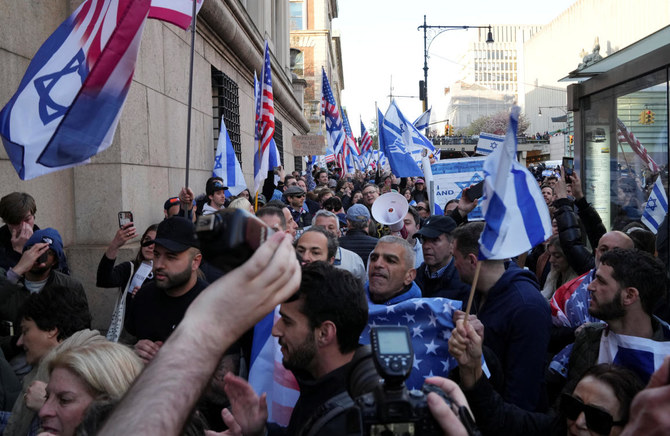
- The demonstrations began at Columbia University in New York and have since spread across the country
Tehran: Iran on Monday criticized a police crackdown in the United States against university students protesting against the rising death toll from the Israel-Hamas war in the Gaza Strip.
“The American government has practically ignored its human rights obligations and respect for the principles of democracy that they profess,” foreign ministry spokesman Nasser Kanani said.
Tehran “does not at all accept the violent police and military behavior aimed at the academic atmosphere and student demands,” he said.
American universities have been rocked by pro-Palestinian demonstrations, triggering campus clashes with police and the arrest of some 275 people over the weekend.
The demonstrations began at Columbia University in New York and have since spread across the country.
In Iran, hundreds of people demonstrated in Tehran and other cities on Sunday in solidarity with the US demonstrations.
Some carried banners proclaiming “Death to Israel” and “Gazans are truly oppressed,” state media reported.
The Gaza war broke out after the October 7 attack by Palestinian militants on Israel which killed 1,170 people, mostly civilians, according to Israeli figures.
Tehran backs Hamas, but has denied any direct involvement in the attack.
Israel’s retaliatory offensive against Hamas has since killed at least 34,488 people in Gaza, mostly women and children, according to the Hamas-run territory’s health ministry.
“What we have seen in American universities in recent days is an awakening of the world community and world public opinion toward the Palestinian issue,” Kanani said.
“It is not possible to silence the loud voices of protesters against this crime and genocide through police action and violent policies.”
Pedro Sanchez stays on as Spain’s prime minister after weighing exit
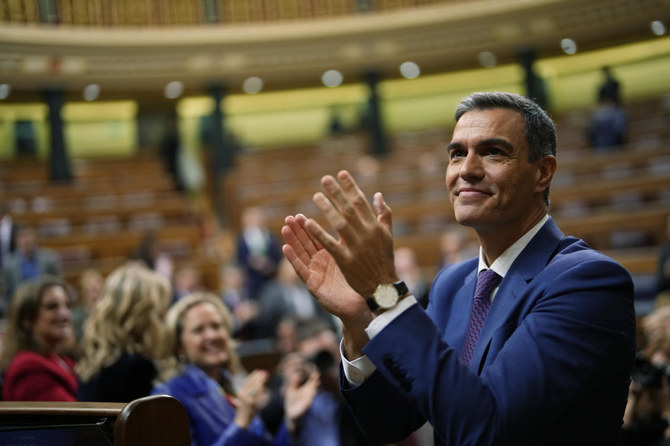
- Sanchez had surprised foes and allies when earlier said he considers quitting
- He described the court investigation of his wife Begona Gomez for influence peddling and business corruption as orchestrated by his opponents
MADRID: Spain’s Prime Minister Pedro Sanchez said on Monday he had decided to continue in office, days after abruptly announcing he was considering his future following the launch of a corruption investigation against his wife.
The center-left prime minister, 52, had surprised foes and allies alike when he said on Wednesday he was taking time from public duty to consider quitting. He described the court investigation of his wife Begona Gomez for influence peddling and business corruption as orchestrated by his opponents.
Sanchez met King Felipe VI on Monday — a step that would have been necessary should he have decided to resign — but announced in a televised address that he had informed the monarch of his decision to stay on. He had been encouraged to stay by widespread expressions of support over the weekend, Sanchez said.
“I have decided to go on, if possible even stronger as prime minister. This is not business as usual, things are going to be different,” he said in a national broadcast.
His announcement that he might quit had caused further turmoil in Spanish politics, where a fractious parliament has struggled to form coalition governments after close elections. Should a new election have been required, it would have been the fourth in five years.
The opposition will try to exploit the sign of indecision from Sanchez, but the impact may be limited because Spain’s political landscape is already so polarized, said Ignacio Jurado, political science professor at Madrid’s Carlos III University.
“His credibility is already hotly contested and voters have already given it to him or taken it away,” he said. “As a leader he has shown a weakness and it’s something that the opposition will exploit a lot.”
Scottish First Minister Humza Yousaf resigns
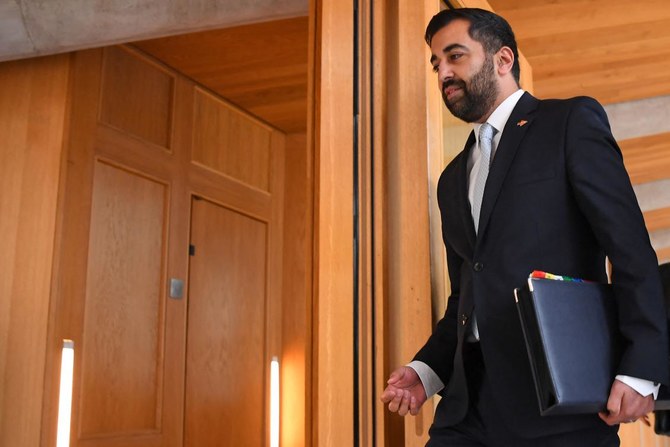
- Humza Yousaf said he would continue as first minister until a successor has been elected.
LONDON: Scotland’s First Minister Humza Yousaf resigned as leader of the Scottish National Party (SNP) on Monday and said he had ordered a contest be held to select a replacement.
“I’ve concluded that repairing our relationship across the political divide can only be done with someone else at the helm,” Yousaf said at a press conference in Edinburgh.
“I have therefore informed the SNP’s national secretary of my intention to stand down as party leader and ask that she commences a leadership contest for my replacement as soon as possible.”
He said he would continue as first minister until a successor has been elected.
Last week, Yousaf abruptly ended a power-sharing agreement between his Scottish National Party (SNP) and the Green Party, in the hopes that he could lead a minority government — but opposition parties have tabled a vote of no confidence.
The pro-independence SNP’s fortunes have faltered amid a funding scandal and the resignation of a party leader last year, while there has been infighting over how progressive its pitch should be as it seeks to woo back voters.
Just days ago, Yousaf said he was “quite confident” that he could win the no confidence vote called by political opponents, but by Monday, his offer of talks with other parties to try to shore up his minority government seemed to be faltering.
The leadership crisis and a second no-confidence vote against the Scottish government deepens problems faced by Yousaf’s Scottish National Party, which is losing popular support after 17 years of heading the Scottish Government.
Earlier this month, polling firm YouGov said the Labour Party had overtaken the SNP in voting intentions for a Westminster election, for the first time in a decade.
The leader of the Scottish Greens, Patrick Harvie, told BBC radio there was nothing Yousaf could say to persuade his party to support the first minister in the parliamentary confidence vote, leaving Yousaf with few options.
The vote is due to take place later this week.
A victory for Labour in Scotland in Britain’s next national election — expected later this year — would significantly bolster the party’s chances of taking power from Prime Minister Rishi Sunak’s Conservative Party.
If Yousaf loses, parliament would have 28 days to choose a new first minister before an election is forced.
Former SNP leader John Swinney has been approached by senior party figures to become an interim first minister in the event of Yousaf being forced from office, the Times newspaper said, adding that Swinney was reluctant to step up because of personal circumstances.
Yousaf, who previously held health and justice ministerial briefs in the Scottish Government, succeeded former SNP leader Nicola Sturgeon as first minister in March 2023.
She resigned last year and has since been embroiled in a party funding scandal with her husband, who was charged this month with embezzling funds. Both deny wrongdoing.



